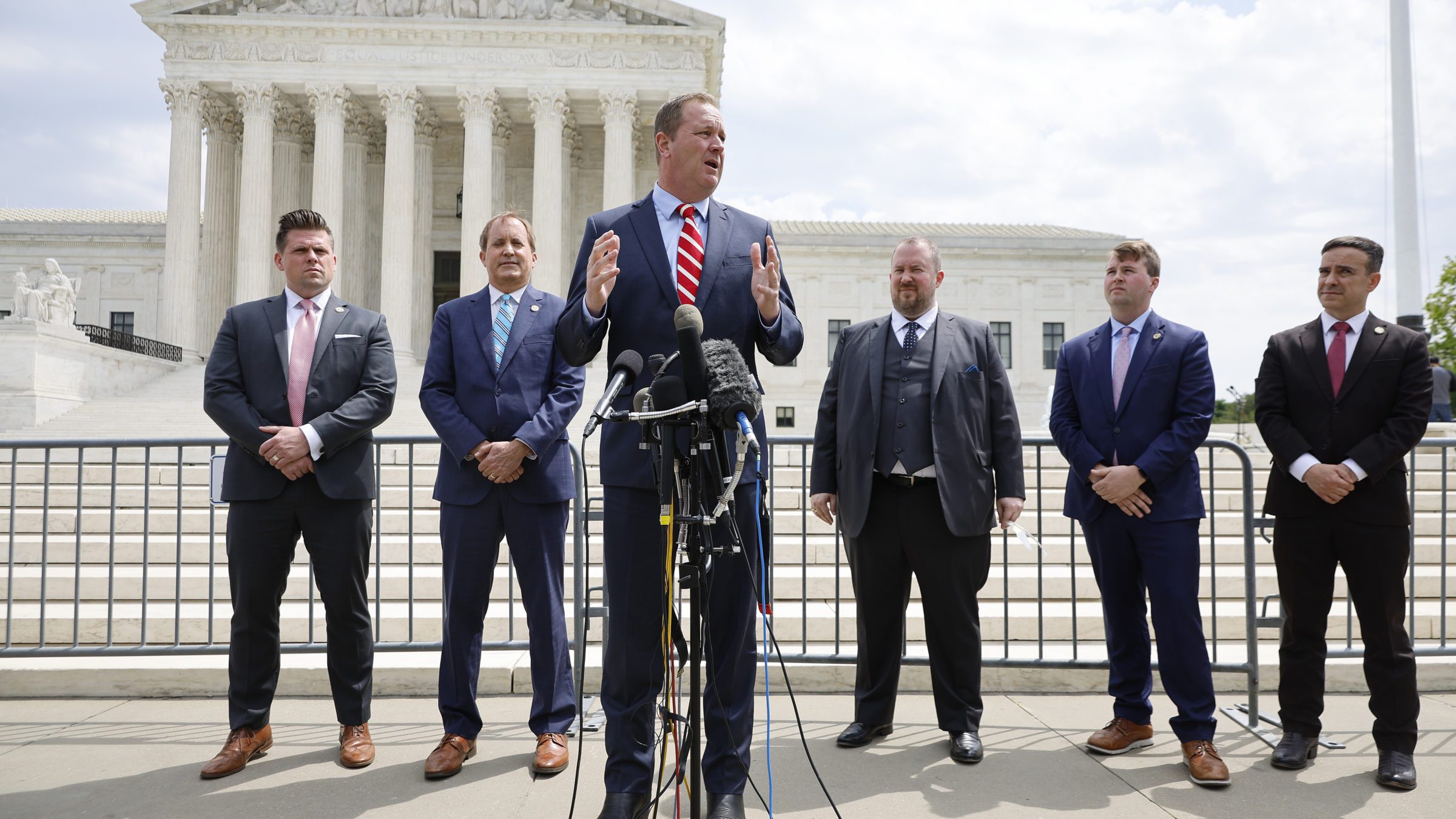The judiciary. The third branch of government. The cabal of absolute freaks who dress in robes for their job. Whatever you call it, the federal bench can be an overwhelming enigma of procedural rules and legal jargon. But here we are, suffering, once more forced to pay attention to the complicated and infuriating machinations of this republic’s system of adjudication, because guess what? The State of Texas is fucking around again—this time, by exploiting the assignment of cases in federal court to hand-pick the judges who preside over its lawsuits against President Joe Biden’s administration.
Texas Attorney General Ken Paxton, a Republican who has been accused by his own staff of a whole host of nefarious behavior like bribery and abuse, is working hard to stack the deck. And in a recent amicus brief filed with the U.S. Supreme Court in a case in which Texas is fighting Biden over immigration policy, University of Texas School of Law professor Stephen Vladeck argues that state officials aren’t just shopping for a favorable forum in which to file their cases—they’re shopping for specific judges on the federal bench. As a result, the state gets like-minded reactionary judges willing to rubber-stamp its arguments.
Here is how filing suit in federal court is supposed to work: The lowest level of the federal court system—the trial courts—is broken down into districts. Some states have just one district, but because Texas is so big, it has four. In Texas, those (also huge) districts are organized into “divisions” which are named for the city in which the federal court is located. The Northern District of Texas, for example, contains seven divisions, including the Dallas Division, the Lubbock Division, and the Amarillo Division, among others.

Missouri Attorney General Eric Schmitt talks to reporters with Texas Attorney General Ken Paxton (2nd from left, frumpy) and Texas Solicitor General Judd Stone (4th from left, frumpier) after the Supreme Court heard arguments in their challenge to the Biden administration’s immigration policy (Photo by Chip Somodevilla/Getty Images)
When deciding where to file a lawsuit, federal law requires that any plaintiff suing the United States file in a district where “a substantial part of the events or omissions giving rise to the claim occurred,” or, if real estate isn’t involved, the district where “the plaintiff resides.” In other words, you generally file your lawsuit where the issue leading to the lawsuit happened, or where you live. After that, the case is assigned randomly to a judge within the division where the suit was filed, and the parties are off to the motions-filing races.
This system exists for a reason. “The random assignment of judges is actually a pretty significant feature of public faith in the impartiality of the judiciary,” Vladeck told me in an interview last week. In an ostensibly impartial court system, who your judge is shouldn’t matter, because their political and ideological persuasions are, in theory, irrelevant to their treatment of a case.
Alas, Paxton and company do not want impartial judges. Silly us for thinking that! Instead, Texas abuses the system of random assignment by taking advantage of the way Texas’s divisions are organized. Each district court designates which judges receive cases in each division. So although the Dallas Division of the Northern District of Texas randomly assigns cases to its 11 judges, some divisions assign civil cases to just a few judges, and some to only one. And of the six other divisions in the Northern District of Texas, where 15 of its 17 judges are Republican appointees, five have one judge hearing most or all cases. By filing in those smaller divisions, Texas can know with near certainty which judge will hear their case.
So far, this judge-shopping spree has been wildly successful. Paxton, who retains his job despite remaining under indictment for securities fraud for the last seven years, has bragged that his office has filed 27 lawsuits against the Biden administration. As Vladeck explains in his brief, of the 19 cases filed on behalf of the Attorney General, the Governor, or the State itself—generally the cases related to the culture wars Paxton loves to fight—18 of those cases are before judges appointed by Republican presidents. All but one of the judges hearing Paxton’s cases were appointed by President Donald Trump.
Part of the reason Paxton has been so successful is that he rarely takes risks. As Vladeck notes, every one of those 19 lawsuits has been in a division with no more than three judges. Twelve were filed in divisions where 100 percent of new civil cases go to Republican-appointed judges, and the other seven were filed in divisions where Republican-appointed judges hear a mere 95 percent of new civil cases. “Put another way,” Vladeck writes, “Texas has filed 19 lawsuits against the federal government without ever risking more than a five-percent chance of having the matter initially assigned to a judge appointed by a Democratic president.”
When he brings this issue up, Vladeck told me that it’s common for Republicans to reply that blue states like California and Hawaii did the same thing when they sued the Trump administration, filing in districts where they knew Democratic appointees were likely to hear their cases. “But it’s important to stress,” Vladeck says, “that California filed cases in the Northern District of California, where there is random assignment among 18 judges. Hawaii filed in Honolulu—where else is Hawaii going to file?” Meanwhile, Texas has not filed even one case in the Austin Division of the Western District of Texas—where, you know, the state government is actually located.
“Texas is choosing to file cases hundreds of miles away from the state capital, typically with no explanation for why a challenge to immigration policy, for example, should be heard anywhere other than the state capital or in courthouses close to the international border,” Vladeck writes.

Texas Governor Greg Abbott, pictured here trying to figure out how to get that 95 percent number up to a cool 100 (Photo by Brandon Bell/Getty Images)
For all of this barely-behind-the-scenes legal gamesmanship, Paxton has already been rewarded by conservative activist judges. In the tiny Victoria Division of the Southern District of Texas, where civil cases are assigned to just one judge,Trump appointee Drew Tipton, Tipton has issued multiple nationwide injunctions against Biden administration policies. In the Amarillo Division of the Northern District of Texas, 500 miles from Paxton’s office in Austin, Paxton has filed six lawsuits, five of which were assigned to Trump appointee Matthew Kacsmaryk, who receives 95 percent of the division’s new civil cases. One of Kacsmaryk’s more brazen orders required the Biden administration to re-implement the Trump-era “Remain in Mexico” policy, and although the Supreme Court overruled him a year later, Kacsmaryk still retains the authority to dictate federal immigration policy at the border from his chambers in Amarillo, some 400 miles away.
The impact of the Trump administration on the federal judiciary has been, to put it mildly, profound. Not only did the former president and his party jam three ultraconservative, fire-breathing armadillos onto the Supreme Court, but by the end of his one term in office, he had appointed more than a quarter of the judges on the federal bench. Nowhere is this looming conservative presence more apparent than in Texas, where judges are reliably moving the law on guns, immigration, abortion, voting, and LGBTQ protections to the right. But for Texas Republicans, good odds aren’t enough. They want a sure thing.

